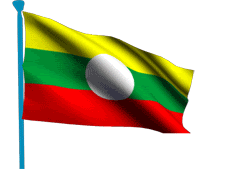Myanmar Hearing Calls to Reform Telecom Market
By : Patrick Barta
Myanmar is considering plans to open its under-developed telecommunications market to large-scale foreign investment, a senior regulator said.
Khin Maung Thet, director-general of Myanmar’s Post & Telecommunications Department, said in an interview that a new communications law is being studied to create four new telecommunications licenses in the country, with the licenses available both to local and foreign investors. Currently, foreigners are not allowed to hold telecom licenses in Myanmar, he said.
The new law was sent to Myanmar’s attorney general last month, he said, and is awaiting his approval now. Once that is obtained, Mr. Khin Maung Thet said, the law will then be sent to Myanmar’s cabinet and then on to Parliament for approval. Mr. Khin Maung Thet said he was not sure when the attorney general would finish reviewing the law.
“The AG is very busy looking at so many other laws” right now, he said. But if the law is changed, the new licenses would “be open to both local and foreign investors,” he added.
The Post & Telecommunications Department is a division of Myanmar’s Ministry of Communications, Posts and Telegraphs, and regulates communications in the resource-rich Southeast Asian country. The plans to revise Myanmar’s telecom laws were also highlighted recently in a research report by analysts at Nomura Securities issued last week.
Efforts to revise Myanmar’s telecommunications laws come amid a flurry of other reforms designed to bolster the country’s under-developed economy and bring in more outside capital, even though the country remains subject to Western economic sanctions. U.S. and European officials have signaled they may be willing to start lifting some of the key sanctions as early as next month, following a year of major changes in Myanmar – including the release of hundreds of political prisoners – after it held its first election in 20 years in 2010.
Among other steps, Myanmar’s government is working to unify the country’s unwieldy multiple exchange rate system, which pegs the Myanmar kyat at about six kyat for every U.S. dollar despite unofficial street rates of about 800 kyat per dollar. People familiar with the situation say officials may float the kyat as early as April – a move that would greatly reduce the complexity of operating in the country.
The government has also just implemented a new law giving workers the right to form unions and it continues to develop other investment rules that could make it easier for foreigners to start businesses there.
Revising the telecoms law, though, could open a huge new field of investment in a country that’s better known for other opportunities, especially its massive natural resources, including natural gas and gems.
Despite having a population of about 60 million people, Myanmar only has around two to three million mobile phone subscribers, according to the recent report from Nomura. Some other sources, such as the U.S. CIA World Factbook, put the number even lower at about 600,000 as of 2010 – fewer than Somalia.
The number of Internet users is also still tiny at about 110,000, according to both sources. Visitors coming from other countries generally aren’t able to use blackberries or other roaming devices, while local residents in recent years have had to pay as much as $1,800 for mobile phones, though prices have come down considerably over the past two years.
The Myanmar government has set a target of having 50% wireless penetration by 2015, Nomura said. Myanmar officials have made clear in conversations with regional diplomats that they hope to make significant progress in developing the local communications industry – including possibly having blackberry service – by as early as 2014, when the country is scheduled to host a regional summit of the Association of Southeast Asian Nations.
If the market does develop, it could begin to look more like Thailand, which has about 65 to 70 million people, though incomes there are much higher. By Nomura’s estimates, the three main phone operators in neighboring Thailand have a combined market capitalization of US$23 billion, though they note that Myanmar’s gross domestic product per capita is just US$1,300, compared to US$9,700 in Thailand.
Myanmar’s government has historically dominated the sector, leaving foreign players largely out of luck. The harsh military regime that dominated Myanmar for decades after taking over in 1962 was suspicious of foreign involvement in sensitive sectors such as communications, and largely insisted on running phone services itself, though foreign companies at times sold equipment there and local companies have begun providing some services.
To be sure, it would be difficult for major Asian or global telecom companies to rush into Myanmar soon, even if a new telecom law is passed. Shareholders of major foreign companies remain wary of Myanmar’s unpredictable legal system as well as its inadequate electricity, transport and other infrastructure. Many companies would like more time to gauge the government’s track record on reforms before deciding to commit large sums.
Still, the country remains a tantalizing market in the long run in a region where many other countries have already seen widespread adoption of mobile devices. By Nomura’s estimation, expansion in Myanmar would fit several regional companies’ business plans, including Singapore Telecommunications Ltd. and Axiata Group Bhd. in Malaysia.
A statement from the Axiata Group said that the company “does continuously consider opportunities which may arise,” with the caveat that any potential business opportunity would have to meet their “strategic criteria and strict financial hurdles.”
A SingTel spokesperson said the company had no comment.
Thursday, March 22, 2012
Myanmar Hearing Calls to Reform Telecom Market
Posted by
Mai Soong Kha
at
6:48 PM
![]()
Labels: Maisoongkha, Myanmar business news, Myanmar news, News
Subscribe to:
Post Comments (Atom)




No comments:
Post a Comment